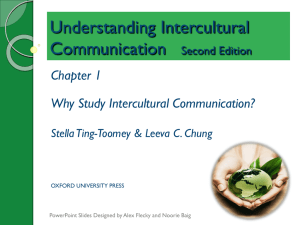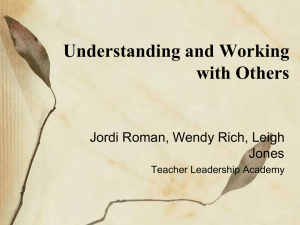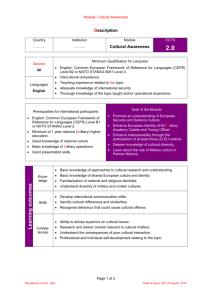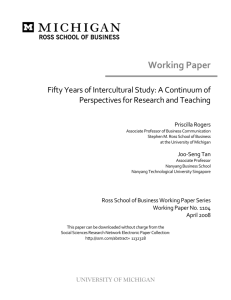docx
advertisement
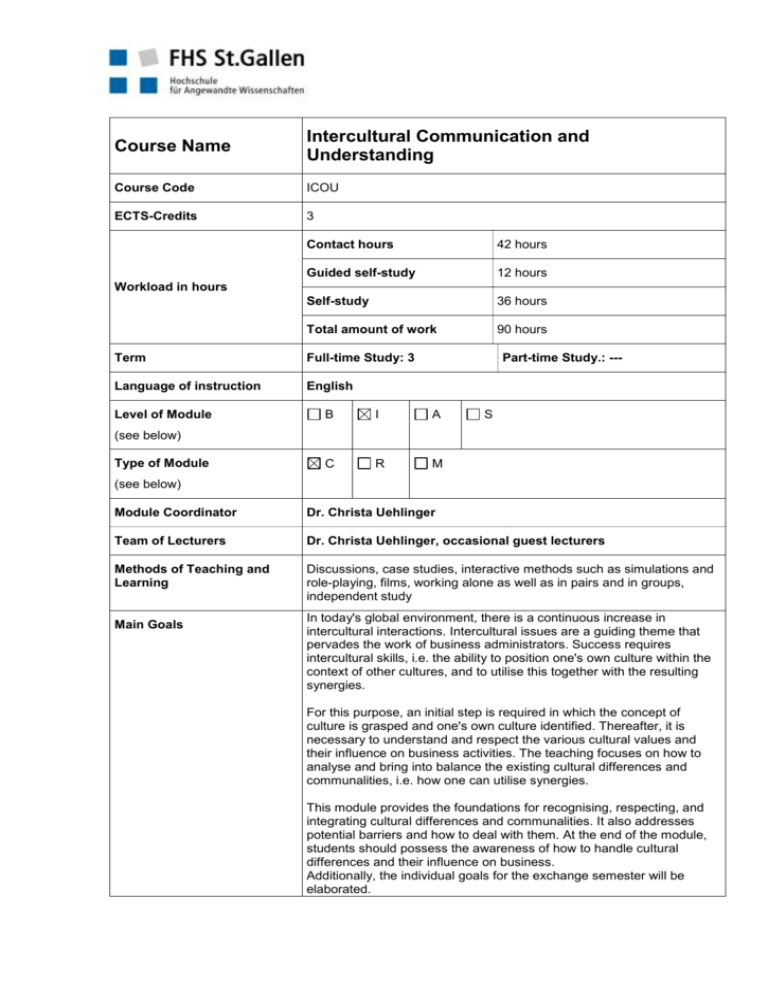
Course Name Intercultural Communication and Understanding Course Code ICOU ECTS-Credits 3 Contact hours 42 hours Guided self-study 12 hours Self-study 36 hours Total amount of work 90 hours Workload in hours Term Full-time Study: 3 Language of instruction English Level of Module Part-time Study.: --- B I A C R M S (see below) Type of Module (see below) Module Coordinator Dr. Christa Uehlinger Team of Lecturers Dr. Christa Uehlinger, occasional guest lecturers Methods of Teaching and Learning Discussions, case studies, interactive methods such as simulations and role-playing, films, working alone as well as in pairs and in groups, independent study Main Goals In today's global environment, there is a continuous increase in intercultural interactions. Intercultural issues are a guiding theme that pervades the work of business administrators. Success requires intercultural skills, i.e. the ability to position one's own culture within the context of other cultures, and to utilise this together with the resulting synergies. For this purpose, an initial step is required in which the concept of culture is grasped and one's own culture identified. Thereafter, it is necessary to understand and respect the various cultural values and their influence on business activities. The teaching focuses on how to analyse and bring into balance the existing cultural differences and communalities, i.e. how one can utilise synergies. This module provides the foundations for recognising, respecting, and integrating cultural differences and communalities. It also addresses potential barriers and how to deal with them. At the end of the module, students should possess the awareness of how to handle cultural differences and their influence on business. Additionally, the individual goals for the exchange semester will be elaborated. Learning Objectives (Competencies) Specialist skills: The participants can/have: Developed cultural-general knowledge and by that their intercultural competencies. Apply the foundations of intercultural communication and theories to intercultural situation Demonstrate knowledge of various models of cultural dimensions and communication styles Find multiple solutions to intercultural challenges by using the 4-step method Recognise and overcome intercultural challenges in everyday business Methodological skills: The participants can: Apply the various models and methods in practice Personal skills: The participants can: Demonstrate awareness of their own culture; in particular, they can reflect on their own culture and the behaviours and attitudes that are based on it Examine a situation from different perspectives Respect various working styles and attitudes and work with them in an open and respectful way. Social skills: The participants can: Further develop their intercultural skills Work across cultural boundaries in a culturally sensitive manner Work together in intercultural teams Change stereotypes into generalisations and treat preconceptions with sensitivity Topics covered Topic module/Learning module I: Recognise Culture and concepts of culture Definition of main intercultural terms Discovering one's own culture and how it influences one’s behaviour and thinking How culture influences business The reaction of individuals to the foreign: stereotypes, acculturation, and culture shock What's required in global business: intercultural competence Topic module/Learning module II: Respect When cultures collide: Critical incident Learn to understand why: Tool 1: Cultural dimension according to Hall, Hofstede, and Trompenaars/Hampden-Turner How culture influences communication: Basic model of communication Communication styles according to Hall and Ting-Toomey Discussion of specific communication situations Topic module/Learning module III: Reconcile How to find solutions: apply 4 steps Possible options in intercultural situations Multicultural teams Prerequisites: No prior knowledge is required. Teaching materials Required reading: ICOU-Reader Case studies Submitted documents Requirements and Assessments Adler, N. J. /Gundersen, A. (2008): International Dimensions of Organizational Behavior, 5th edition, Mason Hofstede, G./Hofstede, G.J./Minkov, M. (2010): Cultures and Organizations: Software of the Mind. 3rd edition, New York Ting-Toomey, St./Chung, L.C. (2012): Understanding Intercultural Communication, 2nd edition, New York Trompenaars, F./Hampden-Turner, Ch. (2012): Riding the waves of cultures, Understanding Cultural Diversity in Global Business, 3rd edition, London Oral exam; duration: X Written exam; duration: 90 minutes, closed book Presentation; duration: Discussion Project Learning report Paper X other, please specify: Individual work (Testatarbeit) Requirements and Assessment Individual work with a sufficiently high standard (Testat) (Please indicate the weight of the different requirements, any aids allowed, any other requirements) Written module-completion exam at the end of the semester, closed book: Dictionary allowed; the two checklists "Cultural dimensions" and "Communication styles" are appended to the exam paper to assist you; no other aids are allowed. The examination covers all topics and documents in intercultural communication. Other comments In this course, it will be expected and regarded as a matter of course that students participate in class and show initiatives. Also, it is strongly recommended to continuously repeat the discussed topics from week to week and to verify open questions. Level of Module: B – Basic level course I – Intermediate level course A – Advanced level course S – Specialised level course Type of Module: C – Core course R – Related course M – Minor course



